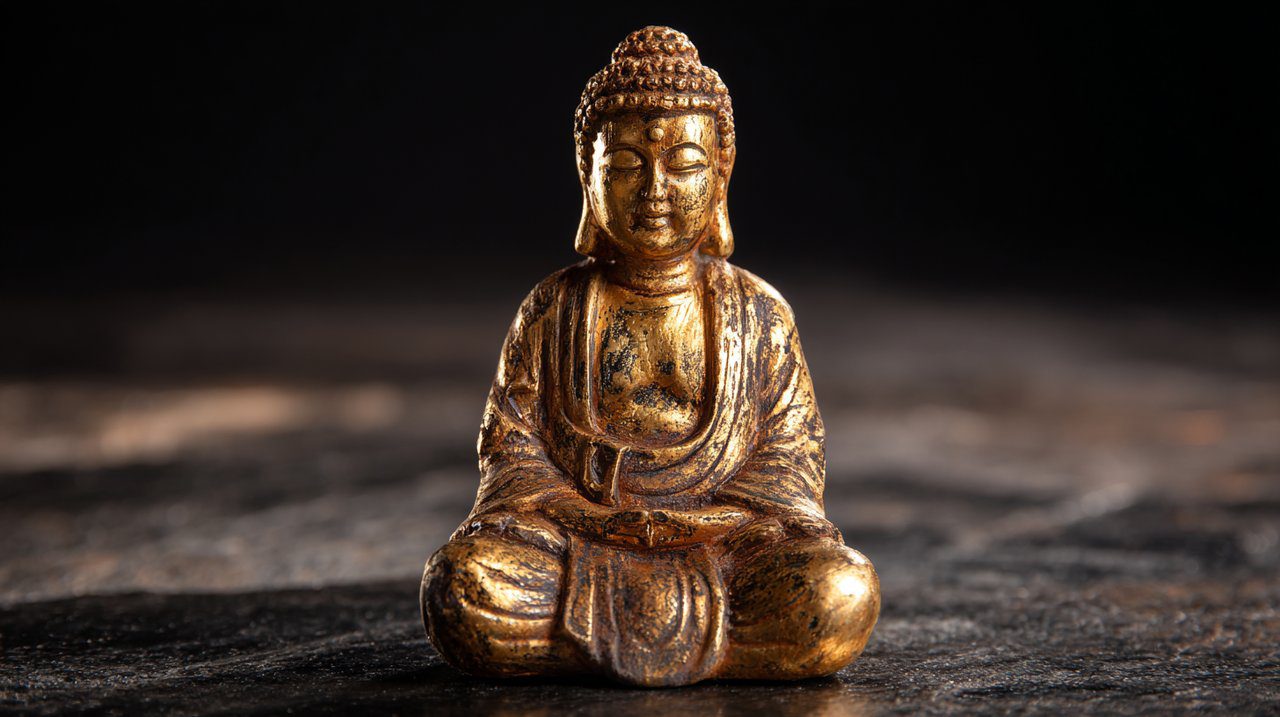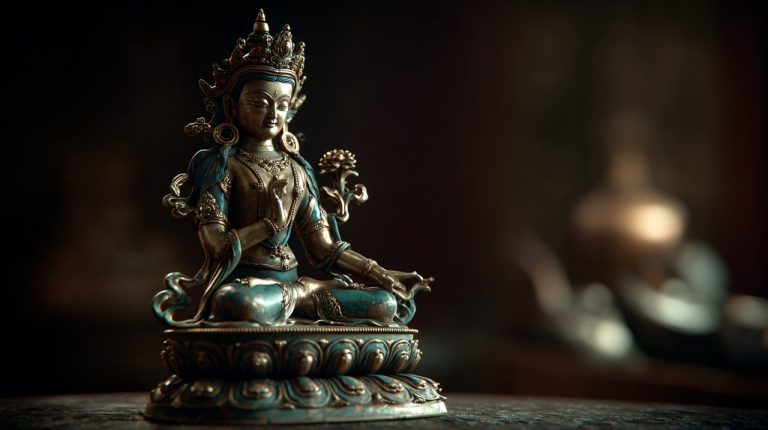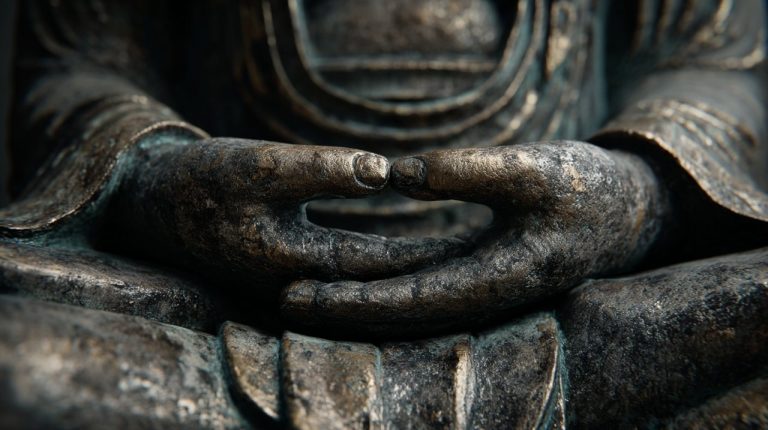The Art of Active Contemplation: 25 Buddha Quotes for Inner Peace and Wisdom Daily
Ever feel like life’s just a relentless tide, pulling you in a million directions? You’re alone. Many of us are searching for that calm, steady anchor within ourselves, a way to navigate the chaos with grace and clarity.
This isn’t about escaping the world; it’s about learning to move through it with a clear mind and a peaceful heart. And guess what? Ancient wisdom offers some incredibly practical tools for this journey.
That’s why we’ve carefully curated 25 powerful Buddha quotes. Think of each one as a tiny, yet mighty, guide designed to light up your path. They’re not just words; they’re invitations to a deeper kind of thinking that cultivates inner peace and real-world wisdom.
The Alchemy of Reflection: Turning Words into Inner Gold
But here’s the secret to unlocking their true power: don’t just read them. We need to move beyond passive consumption and truly *engage* with these insights.
This is where the fascinating neuroscience of contemplative practice steps in. When you actively reflect on wisdom—really ponder its meaning in your own life—you’re giving your brain an incredible workout.
It’s not just processing information; it’s literally forging new neural pathways. This kind of deliberate mental engagement boosts emotional regulation, sharpens focus, and can even quiet that ‘default mode network’ often linked to overthinking.
In essence, abstract wisdom transforms into a tangible shift in how you see and experience the world. It’s quite remarkable, actually!
So, treat each quote like a seed. Plant it in your mind, let its essence sink in, and watch how it connects with your own experiences. Actively look for ways to apply its message.
This is how words truly become inner gold, enriching your being and gently guiding you toward a more serene, insightful life.

1. The Mind is Everything. What You Think You Become.
The mind is everything. What you think you become.
This is a truly profound statement, isn’t it? It points to the incredible power our thoughts hold in shaping everything about our reality.
Think of it this way: your inner world isn’t just a mirror reflecting your circumstances; it’s often the very architect building them. A mind constantly stuck on scarcity or negativity will naturally perceive more limitations and challenges.
But flip that. A mind focused on gratitude and possibility? That mind opens itself to unexpected opportunities and builds incredible inner strength. Your thoughts really do become your destiny.
Actionable Contemplation: For just one day, become a quiet observer of your dominant thoughts. Are they building you up or subtly tearing you down? Pick a simple, positive affirmation related to peace or wisdom, and gently return to it whenever your mind starts to wander into negativity.
2. Peace Comes From Within. Do Not Seek It Without.
Peace comes from within. Do not seek it without.
Many of us spend our lives chasing external conditions, believing that a new job, relationship, or possession will finally bring us contentment. This pursuit, while common, often leads to fleeting happiness, quickly followed by renewed longing.
This quote offers a powerful reminder: true peace isn’t contingent upon external circumstances. It’s an internal state, cultivated independently of what the world presents.
The external world can certainly offer moments of joy or sorrow, but our fundamental peace remains accessible from deep within ourselves.
Guiding Question: What external factors do you currently believe are prerequisites for your inner peace? How might you begin to gently detach your sense of well-being from these conditions?
3. Do Not Dwell in the Past, Do Not Dream of the Future, Concentrate the Mind on the Present Moment.
Do not dwell in the past, do not dream of the future, concentrate the mind on the present moment.
The human mind frequently wanders, doesn’t it? We replay past events with regret or anxiety, or project into future scenarios with hope or fear. This constant mental time travel prevents us from fully experiencing the richness of our current reality.
By anchoring our awareness in the present, we can truly perceive the details of our experience—the sound of rain, the taste of food, the warmth of a touch. This practice fosters a deeper, more vibrant connection with life as it unfolds, right now.
Actionable Contemplation: During your next meal, try focusing solely on the act of eating. Notice the textures, flavors, and aromas without judgment or distraction. Extend this practice to a simple daily task, like walking or washing dishes, and see what you discover.
4. No One Saves Us But Ourselves. No One Can and No One May. We Ourselves Must Walk the Path.
No one saves us but ourselves. No one can and no one may. We ourselves must walk the path.
While support from others is incredibly valuable, the ultimate responsibility for our growth and liberation rests squarely with us. Relying solely on external saviors can actually disempower us, delaying our personal evolution.
This teaching is a powerful call to personal agency. It empowers us to take ownership of our spiritual journey and personal development. It emphasizes self-reliance as a cornerstone of genuine wisdom and inner strength.
Principle & Value: This principle encourages agency and self-mastery. It’s about understanding that while guidance can be offered, the journey of transformation is inherently personal and requires our active, conscious participation.
5. Holding On To Anger Is Like Grasping A Hot Coal With The Intent Of Throwing It At Someone Else; You Are The One Who Gets Burned.
Holding on to anger is like grasping a hot coal with the intent of throwing it at someone else; you are the one who gets burned.
Anger, though a natural human emotion, can become a truly destructive force when we cling to it. When we harbor resentment, the primary harm is often inflicted upon ourselves, manifesting as stress, bitterness, or even physical ailments.
The metaphor of the hot coal vividly illustrates the self-inflicted suffering of sustained anger. It prompts us to consider the true, often hidden, cost of holding onto grievances.
Relatable Scenario: Think of a time you stayed angry at someone for days or weeks. Did that anger truly affect them as much as it consumed your own thoughts and peace of mind? Often, the answer is a resounding ‘no’.
6. All That We Are Is The Result Of What We Have Thought.
All that we are is the result of what we have thought.
Echoing the first quote, this statement powerfully reinforces the profound influence of our internal landscape. Our character, our habits, and ultimately our destiny are shaped by the consistent patterns of our thinking.
This isn’t about magical thinking, but about the cumulative effect of our mental habits. Consistent thoughts lead to consistent actions, which in turn create consistent results and form who we become.
Guiding Question: If your life today is a reflection of your past thoughts, what kind of thoughts would you need to cultivate, intentionally, to create the future you genuinely desire?
7. A Man Is Not Called Wise Because He Talks And Talks Again; But If He Is Peaceful, Loving And Fearless Then He Is In Truth Called Wise.
A man is not called wise because he talks and talks again; but if he is peaceful, loving and fearless then he is in truth called wise.
True wisdom is often demonstrated not through eloquent speech, but through the inherent qualities of one’s being. It’s reflected in a calm demeanor, compassionate actions, and courage in the face of adversity.
This insight challenges the common perception that wisdom is solely an intellectual pursuit. It suggests that the deep integration of understanding into one’s character is what truly defines a wise person.
Principle & Value: This quote elevates qualities like peacefulness, love, and fearlessness far above mere intellectual knowledge, presenting them as the undeniable hallmarks of genuine wisdom.
8. You Yourself, As Much As Anybody In The Entire Universe, Deserve Your Love And Affection.
You yourself, as much as anybody in the entire universe, deserve your love and affection.
Self-compassion is often overlooked, yet it’s absolutely fundamental to our mental well-being and our capacity to offer genuine love to others. Many of us struggle with self-criticism, believing deep down that we are unworthy of kindness.
This quote serves as a gentle yet powerful reminder of our inherent worth. It encourages us to extend the same understanding and care to ourselves that we would so readily offer to a dear friend.
Actionable Contemplation: The next time you notice self-critical thoughts arising, pause. Mentally say to yourself, “Just like anyone else, I deserve love and affection.” Observe how this small shift in your internal dialogue feels.
9. The Root Of Suffering Is Attachment.
The root of suffering is attachment.
This is a cornerstone of Buddhist philosophy. We often cling to possessions, relationships, ideas, and even our own identities, believing they are permanent or essential for our happiness. When these attachments inevitably change or are lost, suffering arises.
Understanding this doesn’t mean we shouldn’t enjoy life or form connections. Instead, it invites us to appreciate things without grasping too tightly, to hold them lightly, recognizing their impermanent nature.
Common Misinterpretation: This is not a call to detach from life or relationships, but to detach from the grasping associated with them. It’s about fostering a flexible mind that can adapt to change without being shattered by it.
10. There Is No Path To Happiness: Happiness Is The Path.
There is no path to happiness: happiness is the path.
Often, we postpone our happiness, believing it will arrive once certain conditions are met: “I’ll be happy when I get that promotion,” or “I’ll be happy when I find the right partner.” This mindset keeps happiness perpetually in the future.
This quote beautifully reframes happiness not as a destination, but as the very way we live and engage with life in the present moment. It’s about cultivating joy and contentment in the journey itself, right now.
Relatable Scenario: Consider a long-term goal you’re pursuing. If you only allow yourself to be happy upon its completion, you miss all the moments of growth, learning, and small successes along the way. Happiness can be found in the process, not just the outcome.
11. Three Things Cannot Be Long Hidden: The Sun, The Moon, And The Truth.
Three things cannot be long hidden: the sun, the moon, and the truth.
This speaks to the inherent nature of reality and the eventual surfacing of truth. While deceptions and illusions may persist for a time, reality ultimately asserts itself. It offers a sense of reassurance in a world often clouded by misinformation.
It encourages us to trust in the natural unfolding of events and to seek truth with patience and discernment. The light of reality eventually breaks through any veil, no matter how thick.
Principle & Value: This quote emphasizes the inevitability of truth and the futility of trying to conceal it indefinitely. It’s a powerful call for authenticity and trust in the universal order.
12. To Conquer Oneself Is A Greater Task Than Conquering Others.
To conquer oneself is a greater task than conquering others.
Throughout history, many have sought to dominate external kingdoms or adversaries. Yet, the most formidable, and ultimately rewarding, battle lies within: mastering our own desires, fears, and destructive impulses.
Achieving this kind of self-mastery requires immense discipline, self-awareness, and courage. This internal victory leads to far more lasting peace and power than any external conquest could ever offer.
Guiding Question: What internal habit or thought pattern feels like your greatest challenge to overcome right now? How might focusing your energy on that internal ‘conquest’ profoundly change your daily experience?

13. Health Is The Greatest Gift, Contentment The Greatest Wealth, Faithfulness The Best Relationship.
Health is the greatest gift, contentment the greatest wealth, faithfulness the best relationship.
In a world often prioritizing material accumulation and external validation, this quote offers a profound re-evaluation of what truly constitutes a rich and meaningful life. It gently redefines our metrics for success and well-being.
It places supreme value on fundamental aspects of human experience that money simply cannot buy. Good health, inner contentment, and loyal relationships are presented as the true, invaluable treasures.
Actionable Contemplation: Take a moment to reflect on these three areas in your life. Where can you invest more energy to cultivate better health, foster deeper contentment, or strengthen faithfulness in your most important connections?
14. The Way Is Not In The Sky. The Way Is In The Heart.
The way is not in the sky. The way is in the heart.
Spiritual paths are often perceived as abstract, ethereal, or disconnected from ordinary life. This quote wisely grounds wisdom, locating its essence not in distant realms, but in our most intimate core.
It implies that genuine insight and guidance arise from our deepest feelings, our compassion, and our moral compass. The path to wisdom, then, is truly an internal journey of the heart, accessible to all.
Deeper Context: This statement subtly counters the idea that spiritual truths are only found in complex doctrines or external deities. It emphasizes the accessible, inner source of profound understanding that resides within each of us.
15. An Insincere And Evil Friend Is More To Be Feared Than A Wild Beast; A Wild Beast May Wound Your Body, But An Evil Friend Will Wound Your Mind.
An insincere and evil friend is more to be feared than a wild beast; a wild beast may wound your body, but an evil friend will wound your mind.
This stark comparison highlights the profound impact of our relationships on our mental and emotional well-being. Physical harm can heal, but psychological wounds inflicted by betrayal or malice can linger for a lifetime, deeply affecting us.
It serves as a powerful cautionary tale about the critical importance of choosing our companions wisely. The company we keep significantly influences our thoughts, feelings, and overall peace of mind.
Principle & Value: This emphasizes the crucial importance of discerning relationships and protecting one’s inner peace from harmful influences. It underscores the profound vulnerability of the mind to those we trust.
16. To Enjoy Good Health, To Bring True Happiness To One’s Family, To Bring Peace To All, One Must First Discipline And Control One’s Own Mind.
To enjoy good health, to bring true happiness to one’s family, to bring peace to all, one must first discipline and control one’s own mind.
This quote outlines a clear causal chain, starting with self-mastery. It suggests that our ability to positively impact our health, our family, and even the wider world stems directly from our internal discipline.
Without a controlled mind, we are prone to impulsive actions, emotional reactivity, and internal chaos, which can undermine all our best intentions. Inner order, it teaches, truly precedes outer harmony.
Actionable Contemplation: Identify one area where a lack of mental discipline is currently impacting your well-being or relationships. Perhaps it’s procrastination or excessive worry. Choose a small, consistent step to bring more intentional control to that mental habit this week.
17. We Are Shaped By Our Thoughts; We Become What We Think.
We are shaped by our thoughts; we become what we think.
This reiterates a fundamental principle: the creative power of the mind. Our thoughts are not inert; they are dynamic forces that mold our perception, our actions, and ultimately, our character. This continuous process of shaping is happening whether we are aware of it or not.
Recognizing this power empowers us to consciously direct our thoughts towards constructive ends. It offers a clear path to intentional self-creation, fostering a life truly aligned with our deeper values.
Guiding Question: What kind of person do you aspire to be? How do your current thought patterns align, or perhaps misalign, with that aspiration? What small shift could you make today?
18. It Is Better To Conquer Yourself Than To Win A Thousand Battles. Then The Victory Is Yours. It Cannot Be Taken From You, Not By Angels Or By Demons, Heaven Or Hell.
It is better to conquer yourself than to win a thousand battles. Then the victory is yours. It cannot be taken from you, not by angels or by demons, heaven or hell.
This quote expands on the theme of self-conquest, emphasizing its unparalleled and immutable nature. External victories are often fleeting and can easily be undone, but mastering oneself yields an internal triumph that is absolutely secure.
This inner victory provides an unshakable foundation for peace and resilience. It is a source of strength that remains untouched by external circumstances, truly making it a permanent achievement.
Principle & Value: This highlights the enduring nature of inner mastery compared to the transient nature of external successes. It powerfully underscores the profound security and freedom found in self-control.
19. Every Morning We Are Born Again. What We Do Today Is What Matters Most.
Every morning we are born again. What we do today is what matters most.
The past is gone, and the future is unwritten. Each new day truly offers a fresh opportunity, a clean slate, to begin anew. This perspective liberates us from the burdens of yesterday and the anxieties of tomorrow.
It encourages a vital focus on the present moment as the sole point of power and action. Our choices and intentions in *this day* are what truly determine the trajectory of our lives.
Relatable Scenario: If you made mistakes yesterday, this quote offers gentle permission to release them. Today is a brand new chance to align your actions with your values, free from past missteps and regrets.
20. Do Not Believe Anything Simply Because You Have Heard It. Do Not Believe In Traditions Because They Have Been Handed Down For Many Generations. But After Observation And Analysis, When You Find That Anything Agrees With Reason And Is Conducive To The Good And Benefit Of One And All, Then Accept It And Live Up To It.
Do not believe anything simply because you have heard it. Do not believe in traditions because they have been handed down for many generations. But after observation and analysis, when you find that anything agrees with reason and is conducive to the good and benefit of one and all, then accept it and live up to it.
This radical statement champions critical inquiry and personal experience over blind faith or dogma. It encourages a spirit of investigation, urging us to test ideas against our own reason and observation.
It is a powerful call for intellectual autonomy and ethical discernment. Wisdom, in this view, is not passively received but actively discovered through a process of careful consideration and practical application for the common good of all.
Actionable Contemplation: When presented with a new idea or belief, especially one that claims authority, pause. Instead of immediate acceptance or rejection, ask yourself: “Does this resonate with my reason? How might I test its truth through my own observation and experience, and does it truly benefit everyone?”

21. The Only Real Failure In Life Is Not To Be True To The Best One Knows.
The only real failure in life is not to be true to the best one knows.
We often define failure by external outcomes: not achieving a goal, losing a competition, or making a mistake. This quote offers a different, far more profound measure of what true failure actually is.
True failure, according to this wisdom, is a betrayal of our inner knowing, our conscience, or our deepest values. It’s when we act against what we genuinely understand to be right or good, regardless of any external result.
Guiding Question: In what areas of your life might you be compromising your integrity or acting against your deeper wisdom? What would it truly mean to be true to the best one knows in those specific situations, starting today?
22. In The End, Only Three Things Matter: How Much You Loved, How Gently You Lived, And How Gracefully You Let Go Of Things Not Meant For You.
In the end, only three things matter: how much you loved, how gently you lived, and how gracefully you let go of things not meant for you.
This quote provides a concise, yet incredibly comprehensive, summary of a life well-lived. It distills the essence of human experience into three fundamental virtues, offering a powerful lens through which to evaluate our priorities.
It emphasizes the profound importance of compassion, mindful action, and the wisdom of detachment. These qualities contribute to a life of deep meaning and inner peace, leaving behind a legacy of grace rather than regret.
Principle & Value: This offers a powerful framework for evaluating a meaningful life, prioritizing love, gentle living, and the profound wisdom of letting go over purely material achievements.
23. The Secret Of Health For Both Mind And Body Is Not To Mourn For The Past, Nor To Worry About The Future, But To Live The Present Moment Wisely And Earnestly.
The secret of health for both mind and body is not to mourn for the past, nor to worry about the future, but to live the present moment wisely and earnestly.
This quote directly links mental and physical well-being to present moment awareness. Dwelling on past regrets or future anxieties creates immense stress, which often manifests in both psychological and physiological ailments.
By focusing our energy on living wisely and earnestly in the now, we significantly reduce mental burden and foster a profound state of calm. This mindful engagement with the present is presented as the key to holistic health.
Actionable Contemplation: When you find yourself caught in a loop of worry or regret, gently bring your attention back to your breath. Feel your feet on the ground. Engage your senses with your immediate surroundings. This simple act can powerfully anchor you in the present.
24. Have Compassion For All Beings, Rich And Poor Alike; Each Has Their Suffering.
Have compassion for all beings, rich and poor alike; each has their suffering.
Compassion is a fundamental virtue, and this quote broadens its scope to include everyone, regardless of their external circumstances. It reminds us that suffering is a universal human experience, transcending all social and economic divides.
Judging others based on their perceived advantages or disadvantages can blind us to their inner struggles. Recognizing the shared experience of suffering fosters genuine empathy and deepens human connection.
Relatable Scenario: When you encounter someone who seems to have ‘everything,’ resist the urge to envy. Instead, remember that every individual faces their own unique battles and inner turmoils, fostering a precious sense of shared humanity.
25. Your Work Is To Discover Your Work And Then With All Your Heart To Give Yourself To It.
Your work is to discover your work and then with all your heart to give yourself to it.
This quote speaks to the profound importance of finding one’s purpose or calling, and then dedicating oneself fully to it. It suggests that a deep sense of fulfillment comes from engaging wholeheartedly with truly meaningful endeavors.
“Work” here extends far beyond a mere job; it encompasses our unique contribution to the world, our passions, and our personal growth. Discovering and committing to this ‘work’ brings a profound sense of peace and clear direction.
Guiding Question: What activities or pursuits genuinely ignite your passion and feel like a true expression of yourself? How might you dedicate more of your heart and energy to these areas, starting today?
Remember how we started, seeking that quiet harbor within? The journey is ongoing, and the art of active contemplation is your steady compass.
It’s not a one-and-done deal; it’s a beautiful, continuous practice. It’s how you transform these ancient insights into a living, breathing guide for your everyday life.
By truly engaging with these teachings, you’re not just passively absorbing information. You’re actively reshaping your inner world, cultivating deeper compassion, resilience, and crystal-clear clarity.
The path to inner peace and wisdom isn’t about grand, sweeping declarations. It’s found in the quiet, consistent work of observing your own mind and gently aligning your actions with these timeless truths.
So, right now, pick just one quote that truly speaks to you. Let its wisdom settle deep within your heart, and allow it to illuminate your very next step.
This incredible journey of self-discovery, fueled by mindful reflection, is always unfolding, offering endless opportunities for growth and profound serenity. Keep returning to these wellsprings of wisdom; they’ll be your constant companions on the path.
💡 Preguntas Frecuentes
Instead of just reading, actively reflecting on Buddha's quotes by pondering their meaning and connecting them to personal experiences allows the mind to forge new neural pathways. This deliberate engagement boosts emotional regulation, sharpens focus, and can quiet overthinking, effectively turning abstract wisdom into a tangible shift in perception and experience.
This quote emphasizes the profound power of thoughts in shaping reality. A mind focused on negativity perceives limitations, while one focused on gratitude opens to opportunities. Daily application involves observing dominant thoughts, identifying if they are constructive or destructive, and practicing a simple, positive affirmation when negativity arises.
The article explains that many chase external conditions for happiness, leading to fleeting contentment. True peace is an internal state, independent of external circumstances. The implication is that happiness is not a destination to be reached after achieving certain goals, but rather a way of living and engaging with life in the present moment.
The article states that attachment to possessions, relationships, ideas, or identities is the root of suffering. When these attachments change or are lost, distress occurs. The recommended approach isn't detachment from life, but rather appreciating things without grasping too tightly, understanding their impermanent nature, and fostering a flexible mind.
Conquering oneself is presented as a greater task than conquering others. This internal victory over one's own desires, fears, and impulses is considered more lasting and secure because it cannot be taken away, unlike external victories which are often fleeting and subject to change.







